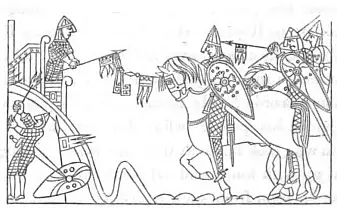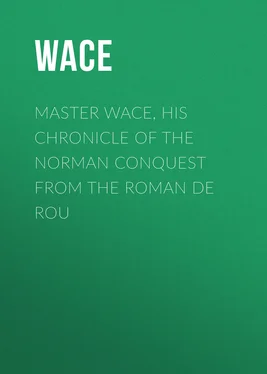Wace - Master Wace, His Chronicle of the Norman Conquest From the Roman De Rou
Здесь есть возможность читать онлайн «Wace - Master Wace, His Chronicle of the Norman Conquest From the Roman De Rou» — ознакомительный отрывок электронной книги совершенно бесплатно, а после прочтения отрывка купить полную версию. В некоторых случаях можно слушать аудио, скачать через торрент в формате fb2 и присутствует краткое содержание. Жанр: foreign_prose, История, foreign_edu, foreign_antique, на английском языке. Описание произведения, (предисловие) а так же отзывы посетителей доступны на портале библиотеки ЛибКат.
- Название:Master Wace, His Chronicle of the Norman Conquest From the Roman De Rou
- Автор:
- Жанр:
- Год:неизвестен
- ISBN:нет данных
- Рейтинг книги:4 / 5. Голосов: 1
-
Избранное:Добавить в избранное
- Отзывы:
-
Ваша оценка:
- 80
- 1
- 2
- 3
- 4
- 5
Master Wace, His Chronicle of the Norman Conquest From the Roman De Rou: краткое содержание, описание и аннотация
Предлагаем к чтению аннотацию, описание, краткое содержание или предисловие (зависит от того, что написал сам автор книги «Master Wace, His Chronicle of the Norman Conquest From the Roman De Rou»). Если вы не нашли необходимую информацию о книге — напишите в комментариях, мы постараемся отыскать её.
Master Wace, His Chronicle of the Norman Conquest From the Roman De Rou — читать онлайн ознакомительный отрывок
Ниже представлен текст книги, разбитый по страницам. Система сохранения места последней прочитанной страницы, позволяет с удобством читать онлайн бесплатно книгу «Master Wace, His Chronicle of the Norman Conquest From the Roman De Rou», без необходимости каждый раз заново искать на чём Вы остановились. Поставьте закладку, и сможете в любой момент перейти на страницу, на которой закончили чтение.
Интервал:
Закладка:
But the duke had now great power; for he was very prudent, and no man is weak who possesses wisdom. He sent for William of Arches, and summoned him to attend, and do his service: but he altogether refused, and defied the bastard, relying on aid from the king of France. He plundered the country round of provisions and stores of every sort, heeding little whence it came, and thus supplied his castle and tower.
The duke bore with this behaviour but a very little while, and without further 'parlement' sent for his people from all sides. Then with ditches and stakes and palisades he quickly formed a fort 66 66 'Chasteillun,' afterwards 'Chastelet.'
, at the foot of the hill in the valley, so as to command all the country round, and prevent those in the castle from obtaining either ox, or cow, or calf: and the fort was so strong, and was garrisoned by so many knights, the best of the chivalry of all Normandy, that no effort of either king or earl to take it, was likely to be of any avail. So the duke, having thus completed his work, went his way to attend to his affairs elsewhere.
The king of France soon knew that the duke had fortified his post, and blockaded the tower, so that no provisions could enter therein. Then he assembled a great chivalry, and got together much store of provisions and arms, intending to relieve the tower of Arches, where the supply of corn began to fail. Having reached Saint-Albin 67 67 St. Aubin-le-Cauf, on the other side of the valley. There is another St. Aubin, south of Arques.
, with an ample store both of corn and wine, the king made a halt, ordering sumpter horses to be made ready to carry the stores onward, and providing a troop of knights to form the convoy.
Those in the besiegers' fort soon heard of the great preparations waiting at Saint-Albin to provision and relieve Arches. Then they selected their strongest and best fighting men, and privily formed an ambuscade in the direction of Saint-Albin. Having done this, they sent out another party with orders to charge the king's force, and then to turn back, making as if they would flee. But when they had passed the spot where the ambuscade lay, they turned quickly round on those who were pursuing, and fiercely attacked the French; those also who were lying in ambuscade riding forth, and joining in the assault.
The Frenchmen were thus grievously taken in; and being separated from the rest of their army, the Normans charged them boldly, and took and killed many. Hue Bardous 68 68 Hugh Bardolf, a distinguished name in Norman and English history. In the roll of Norman fees in the red book of the Exchequer, we find Doon Bardulf returned as one of those, 'qui non venerunt nec miserunt nec aliquid dixerunt.'
was taken early in the affray; Engerrens count of Abevile 69 69 Enguerran, count of Ponthieu, the second of the name, nephew of Guy the bishop, who afterwards wrote the latin poem on the battle of Hastings, which is now in the press at Rouen. He succeeded his father, Hugh II. in 1052; and was himself succeeded by his brother Guy, afterwards taken prisoner at the battle of Mortemer, their brother Valeran being killed there. Mr. Stapleton has, in the Archæologia , vol. 26, shown that this Enguerran married Adelidis, sister of the whole blood to the Conqueror; and that Adelidis, wife of Odo, Count of Champagne, was one of her daughters; the other being Judith, wife of Waltheof.
, was killed, and all suffered greatly. The king of France was in great grief; he mourned heavily, and was sorely vexed for the knights that had been thus surprised, and for his brave barons who had fallen. He made ready the baggage horses, and carried the stores to the town of Arches; and when he had so done, he returned back to Saint-Denis with no small shame and disgrace, as it seems to me.
The duke was sojourning at Valognes, for the sake of the woods and rivers which abound there, and on other affairs and business of his own, when a messenger came spurring on with pressing speed, and hastening unto him, cried out and said, "Better would it be for thee to be elsewhere! they who guard the frontiers have need of thy aid; for thy uncle William of Arches hath linked himself by oath and affiance to king Henry of France. The king hasteth to relieve and store Arches, and William will do him service for it in return."
Then the duke tarried not till the varlet should speak further, nor indeed till he had well said his say; but called for his good horse. "Now I shall see," said he, "who of you is ready, now I shall see who will follow me." And he made no other preparation, but forthwith crossed the fords 70 70 The fords of St. Clement, which have been before noticed. The places next mentioned are Bayeux, Pont-Audemer, Caudebec, and Bans or Baons-le-Comte, near Ivetot.
, passed Baieues and then Caen, and feigned as though he would go to Rouen. But when he came to Punt-Audumer, he crossed over to Chaudebec, and from Chaudebec rode on to Bans-le-Cunte. What need of many words? He hasted and galloped on till he joined his people before Arches; but none of those who took horse at the same time at Valognes kept up with him; and all wondered how he had come so soon from such a distance, when no one else had been able to do as much 71 71 William of Poitiers varies somewhat from Wace's account; he gives William six attendants on this occasion.
.
Then he rejoiced greatly to learn what had happened; how the French had been discomfited, and their people routed and taken prisoners. William of Arches however kept close, defending his castle bravely and long; and he would have held it longer still, had not provisions failed him. So at length he abandoned land, and castle, and tower; and surrendering all up to duke William, fled to the king of France.

CHAPTER V.
HOW THE KING OF FRANCE INVADED NORMANDY, AND WAS BEATEN AT MORTEMER
The French had often insulted the Normans by injurious deeds and words, on account of the great dislike and jealousy which they bore to Normandy. They continually spoke scornfully, and called the Normans BIGOZ and DRASCHIERS 72 72 BIGOT has been supposed to have its origin in the BY-GOD of a northern tongue; and to have been used as a war cry by early Normans, answering to the later DEX-AIE. Anderson, in his Genealogical Tables , says, without quoting his authority, that Rollo was called By-got, from his frequent use of the phrase. See our subsequent note on Bigot as a family name. DRASCHIERS is understood to mean consumers of barley, probably as the material of beer.
; and often remonstrated with their king, and said, "Sire, why do you not chase the Bigoz out of the country? Their ancestors were robbers, who came by sea, and stole the land from our forefathers and us." By the persuasion of these felons, who talked thus because they hated the duke, the king undertook the enterprise 73 73 The affair at Mortemer, next related, took place in 1054, after the siege and retreat of Arques; which this attack was probably meant to revenge.
; though it was disliked by many of his men. He said he would go into Normandy, and would conquer it; he would divide his army into two parts, and invade in two directions. And what he said, he endeavoured to execute; summoning his people from all sides.
He collected them in two positions, according as the river Seine divided them; those of Reins and those of Seissons, of Leun 74 74 Laon.
, and of Noions; those of Melant 75 75 Meulan.
, and of Vermandeiz; of Pontif 76 76 Ponthieu, and the country of Amiens.
and of Amineiz; those of Flanders and of Belmont 77 77 Beaumont-sur-Oise.
; of Brie and of Provens. All these, who are beyond Seine he assembled by twenties, by hundreds, and by thousands, in Belveisin, meaning to enter the pays de Caux from that side. To the Conestable and Guion 78 78 Guy, count of Ponthieu, successor of the one killed at Arques.
, he sent his brother Odo 79 79 Eudes, or Odo, fourth son of King Robert.
, and directed them to enter by Caux, and ravage all the land around.
Интервал:
Закладка:
Похожие книги на «Master Wace, His Chronicle of the Norman Conquest From the Roman De Rou»
Представляем Вашему вниманию похожие книги на «Master Wace, His Chronicle of the Norman Conquest From the Roman De Rou» списком для выбора. Мы отобрали схожую по названию и смыслу литературу в надежде предоставить читателям больше вариантов отыскать новые, интересные, ещё непрочитанные произведения.
Обсуждение, отзывы о книге «Master Wace, His Chronicle of the Norman Conquest From the Roman De Rou» и просто собственные мнения читателей. Оставьте ваши комментарии, напишите, что Вы думаете о произведении, его смысле или главных героях. Укажите что конкретно понравилось, а что нет, и почему Вы так считаете.












